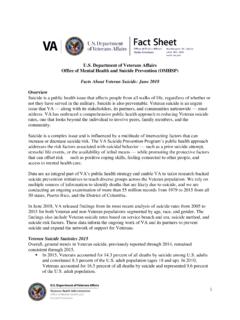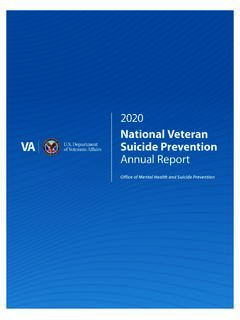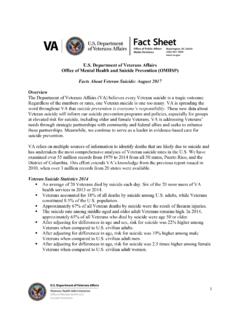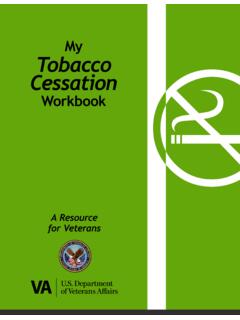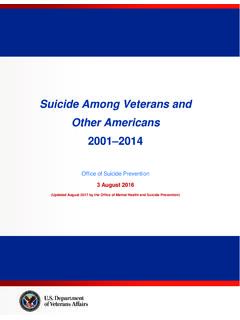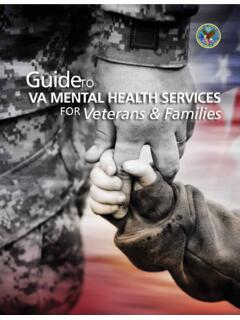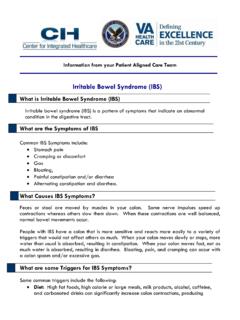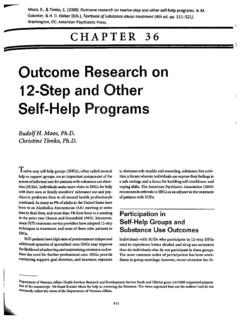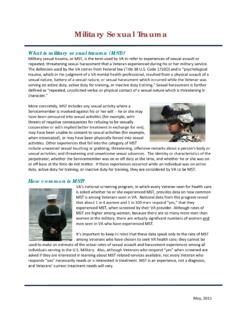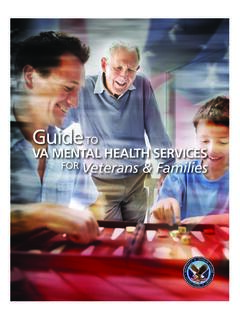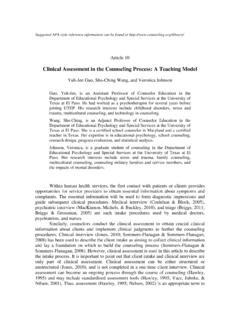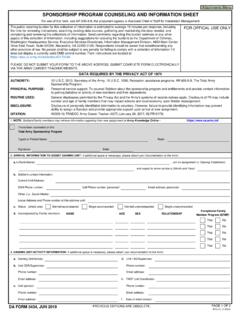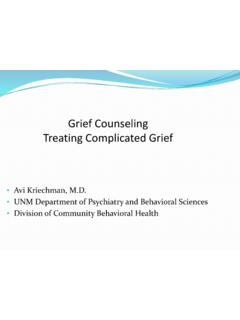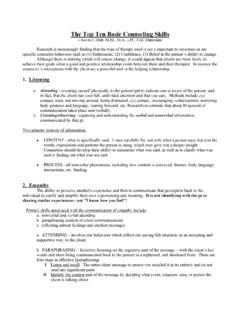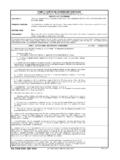Transcription of Sample Script of an Initial Brief Alcohol Counseling Session
1 Information Sheet for Behavioral Health Providers in Primary Care Sample Script of an Initial Brief Alcohol Counseling Session Introduce the Subject with a Transitional Statement From your answers it appears that you may be experiencing harm from your current level of drinking. Specifically, you indicated that in the past year you: list harms that were identified through the assessment. I would like to take a few minutes to talk to you about it. Present the Guide to Low-Risk Drinking & Point to Panel 2: The Drinkers Pyramid The best way to explain the health risks connected with your Alcohol use is by following the illustrations in this booklet.
2 Let s take a look at it and then I will give you a copy to take home with you. The first illustration, called the Drinkers Pyramid, describes four types of drinkers. While many people abstain from Alcohol completely, most people who drink do so sensibly. This third area represents High Risk Drinkers. High risk means that people who drink at heavier levels are more likely to experience problems related to their Alcohol use. This top area represents people whose drinking has led to dependence or severe problems. Your responses to the questionnaire indicate that you fall into the High Risk category.
3 Your level of drinking presents serious risks to your health and possibly other aspects of your life. Show Panel 3 and Provide Information on the Effects of High-Risk Drinking This picture shows the kinds of health problems that are caused by high-risk drinking. Have you ever experienced any of these problems yourself? As you can see, this level of drinking can cause serious risks to your health. The best way to avoid these problems is to cut down on the frequency and quantity of your drinking so that you reduce your risk, or abstain entirely from Alcohol . Do you have any questions? Sample Script for Initial Alcohol Counseling (continued) Sample Script for Brief Alcohol Counseling July 2013 Page 2 Show Panel 4 & Discuss Sensible Limits with Participants who Choose to Drink at Low-Risk Levels We ve talked a lot about High Risk Drinking, now let s talk about Low Risk drinking and what that would look like.
4 According to experts, you should not have more than 14 drinks per week (7 for women) and no more than 4 on any given day (3 for women). Since most people don t often think about their drinks as standard drinks let me show you what that means. Introduce Panel 5 What s a Standard Drink? It is essential to understand how much Alcohol is contained in the different beverages you are drinking. Once you do this you can count your drinks and try to stay within low-risk limits. This figure shows different types of alcoholic beverages. Did you know that one glass of wine, one bottle of beer, and one small shot of spirits all contain approximately the same amounts of Alcohol ?
5 If you think of each of these as a standard drink, then all you need to do is count the number of drinks you have each day. Go back to Panel 4 To minimize the risk of developing the health problems I mentioned earlier and/or Alcohol dependence, you should limit yourself to two drinks per day, and there should be at least two days a week when you do not drink Alcohol . You should always avoid drinking to intoxication, which can result from as little as two or three drinks on a single occasion. Moreover, there are situations in which you should never drink, such as the ones listed here. Assess Current Stage of Change Now that we have gone over the risks associated with your current level of drinking and the recommendations on what is low risk drinking, I d like to spend some time talking about what you think about your current level of drinking.
6 Give participant Readiness Ruler, explain scale and ask them to rate their current level of readiness to change. On a 1 to 10 scale, with 1 meaning not that important and 10 meaning very important, how important do you feel it is for you to change your current level of drinking? Depending on the number on the Readiness Ruler that the patient selects, proceed to the appropriate Stage of Change Section and continue with the Script . Sample Script for Initial Alcohol Counseling (continued) Sample Script for Brief Alcohol Counseling July 2013 Page 3 For Precontemplators (Readiness Ruler Score 1-3): From what you are saying, it sounds like you feel comfortable with your current level of drinking and don t see the need to change.
7 Since you are not ready to commit to a change in your drinking habits yet, would you be willing to think more about the information we ve gone over today? I can write that down in the goals section if it is okay with you. I will call you in a few weeks to see if you have any additional questions. I m also going to give you this self-help booklet. Briefly review booklet with participant. As you can see, if you decide that you do want to change your drinking, it gives you information about how to cut down or eliminate your drinking. Conclude the Session : I will be calling you 2 weeks from now and again 6 weeks from now to see how you are doing.
8 Please call me or come back for another visit if you would like to discuss any of this information further in between that time. For Contemplators (Readiness Ruler Score 4-6): Go through Good Reasons for Drinking Less section of Self-help booklet. From your answer, it sounds like you do feel as if there is a need to at least consider changing your current levels of drinking. Since that is the case, I d like to take a look at this other booklet that I m going to give you to take home. As you can see, on this page, it lists the other potential benefits when you decide to either cut down to a low risk drinking level or stop drinking altogether.
9 Why don t you take a moment and read them over? Any questions? Briefly review rest of booklet with participant. Do you think you would like to set a goal to change your drinking? If Participant Answers NO OK, I encourage you to think about the information we have discussed today, in particular the benefits of changing your drinking. Go to Conclude Session With Encouragement section: And use as the RESTATE GOAL .. thinking about the information discussed. Sample Script for Initial Alcohol Counseling (continued) Sample Script for Brief Alcohol Counseling July 2013 Page 4 If Participant Answers YES OK, we could talk about setting a goal now.
10 Point to Panel 6 and Discuss the Need to Stop Drinking or Cut Down. There are certain things to consider when thinking about whether you might want to stop drinking entirely or cut down on your drinking. Let s go through these together and see what might be best for you. Thinking back over the whole year, what has your drinking been like? Have you had any signs of Alcohol dependence like feeling nauseous or shaky in the morning, or can you drink very large amounts of Alcohol without appearing to be drunk? Go through all Stop Drinking Criteria listed on Panel 6 If participant answers yes to any of the Stop Drinking Items: It seems that there are some indications that you should stop drinking entirely.
